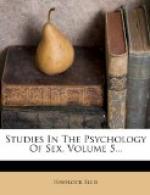FOOTNOTES:
[169] See, e.g., Groos, AEsthetische Genuss, p. 249. “We have to admit,” Groos observes, “the entrance of another instinct, the impulse to tend and foster, so closely connected with the sexual life. It is seemingly due to the co-operation of this impulse that the little female bird during courtship is so often fed by the male like a young fledgling. In man ‘love’ from the biological standpoint is also an amalgamation of two needs; when the tender need to protect and foster and serve is lacking the emotion is not quite perfect. Heine’s expression, ’With my mantle I protect you from the storm,’ has always seemed to me very characteristic.” Sometimes the sexual impulse may undergo a complete transformation in this direction. “I believe there is really a tendency in women,” a lady writes in a letter, “to allow maternal feeling to take the place of sexual feeling. Very often a woman’s feeling for her husband becomes this (though he may be twenty years older than herself); sometimes it does not, remaining purely sex feeling. Sometimes it is for some other man she has this curious self-obliterating maternal feeling. It is not necessarily connected with sex intercourse. A prostitute, who has relations with dozens of men, may have it for some feeble drunken fool, who perhaps goes after other women. I once saw the change from sex feeling to mother feeling, as I call it, come almost suddenly over a woman after she had lived about four years with a man who was unfaithful to her. Then, when all real sex feeling, the hatred of the woman he followed, the desire he should give her love and tenderness, had all gone, came the other feeling, and she said to me, ’You don’t understand at all; he’s only my little baby; nothing he does can make any difference to me now.’ As I grow older and understand women’s natures better, I can see almost at once which relation it is a woman has to her husband, or any given man. It is this feeling, and not sex passion, that keeps woman from being free.” Not only is there a sexual association in the impulse to foster and protect, there would appear to be a similar element also in the response to that impulse. Freud has especially insisted on the partly sexual character of the child’s feelings for those who care for it and tend it and satisfy its needs. It is begun in earliest infancy; “whoever has seen the sated infant sink back from the breast, to fall asleep with flushed cheeks and happy smile, must say that the picture is adequate to the expression of the sexual satisfaction of later life.” The lips, moreover, are the earliest erogenous zone. “There will, perhaps, be some opposition,” Freud remarks (Drei Abhandlungen zur Sexualtheorie, pp. 36, 64), “to the identification of the child’s feelings of tenderness and appreciation for those who tend it with sexual love, but I believe that exact psychological analysis will place the identity beyond doubt. The relationship




